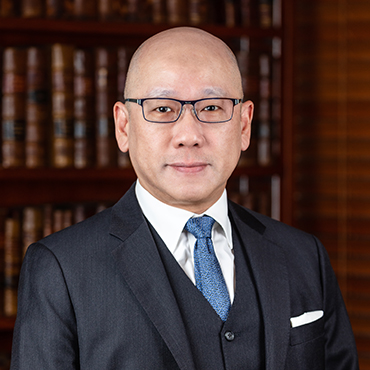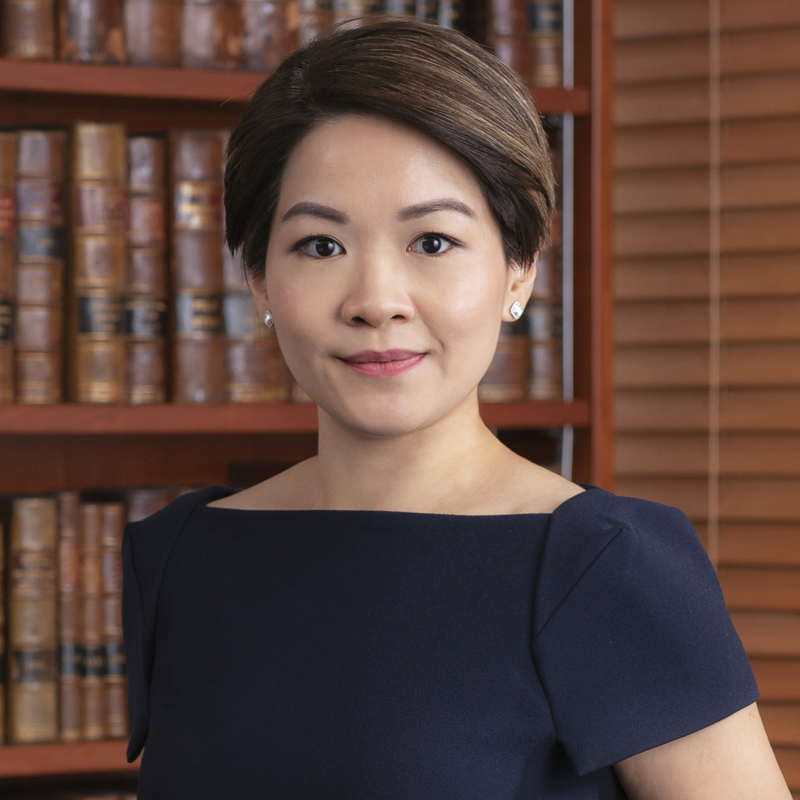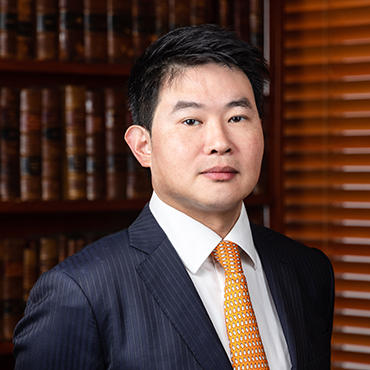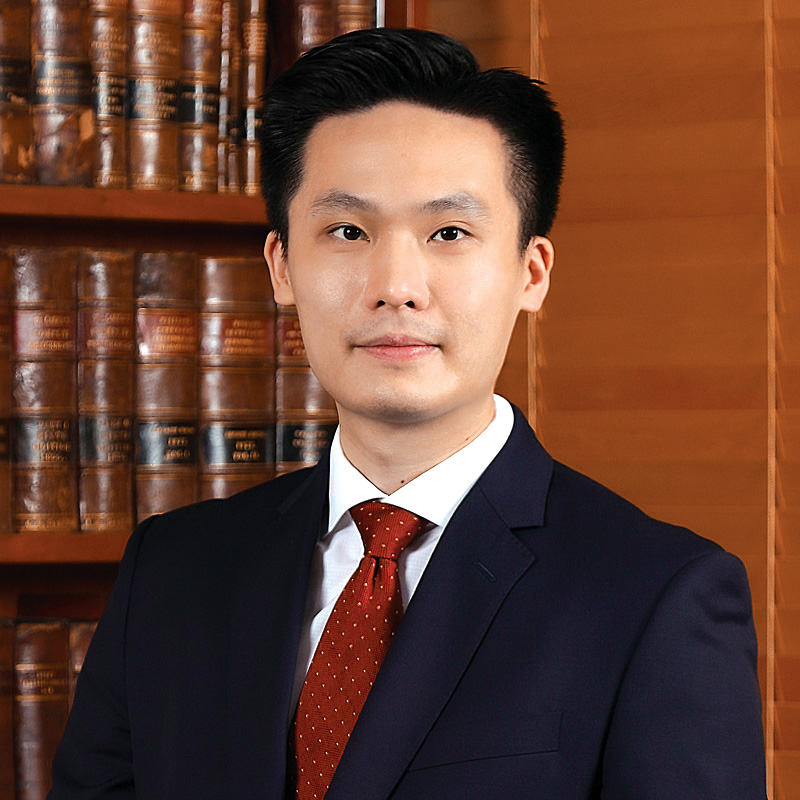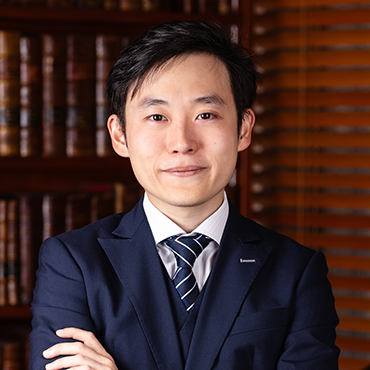HKSAR v Ng Gordon Ching Hang (吳政亨) & Ors (No 2) [2025] 1 HKC 480, [2024] HKCFI 3298 (Robert Pang SC, Pauline Leung, Albert Wong, Esmond Wong, Jason Szeto)
Robert Pang SC, Winnie Li and Max Chan represented the 7th Defendant, Albert Wong and Hayley Wong represented the 9th Defendant, Albert Wong represented the 13th Defendant, Pauline Leung represented the 22nd Defendant, Albert Wong and Jason Szeto represented the 44th Defendant, and Esmond Wong represented the 45th Defendant in HKSAR v Ng Gordon Ching Hang (吳政亨) & Ors (No 2) [2025] 1 HKC 480, [2024] HKCFI 3298.
Forty-seven defendants were indicted of one count of conspiracy to commit subversion, contrary to art 22(3) of the Law of the People’s Republic of China on Safeguarding National Security in the Hong Kong Special Administrative Region (NSL) and ss 159A and 159C of the Crimes Ordinance (Cap 200). The particulars of offence were that the defendants, between 1 July 2020 and 7 January 2021, in Hong Kong, conspired together and with other persons, with a view to subverting the State power, to organize, plan, commit or participate in, by unlawful means (namely: (i) advocating, engaging or participating in a scheme with a view to abusing his or her powers and functions entrusted under art 73 of the Basic Law of the HKSAR after being elected to be a member of the Legislative Council (LegCo) for the purposes of: (a) obtaining a controlling majority in the LegCo to indiscriminately refuse to pass any budgets or public expenditure to be introduced by HKSAR Government regardless of their contents or the merits of their contents; (b) compelling the Chief Executive of the HKSAR (CE) to dissolve LegCo under art 50 of the Basic Law so as to paralyse the operations of the Government; (c) ultimately causing the CE to resign under art 52 of the Basic Law entailed by the dissolution of LegCo and the refusal to pass the original budget by the new LegCo (collectively referred to as the Scheme); (ii) with a view to carrying out the Scheme, to stand or not to stand as candidates in the 2020 LegCo election, and/or inciting, procuring, inducing or causing others to stand or not to stand as candidates in the LegCo election; (iii) undertaking or agreeing, and/or inciting, procuring, inducing or causing others to undertake or agree to exercise or forbear to exercise his or her powers and functions under art 73 of the Basic Law after being elected as a LegCo Member when examining and approving budgets or public expenditure to be introduced by the Government in accordance with the Scheme; (iv) undertaking or agreeing, and/or inciting, procuring, inducing or causing others to undertake or agree, to willfully or intentionally fail or neglect to discharge his or her duties of a LegCo Member after being elected in the 2020 LegCo election, that is, to uphold the Basic Law, bear allegiance to HKSAR of the People’s Republic of China and serve HKSAR conscientiously, dutifully, in full accordance with the Basic Law, honestly and with integrity), seriously interfering in, disrupting or undermining the performance of duties and functions in accordance with the law by the body of power of the HKSAR. The prosecution case was that the 16 defendants together with others agreed to pursue a course of conduct which was to indiscriminately veto any budgets or refuse to pass any budgets or public expenditure to be introduced by the Government regardless of the merits or the contents, in the event that they were elected to be LegCo Members and after obtaining a majority in the 2020 LegCo election with the intention of compelling the CE to respond to the ‘Five Demands Not One Less’ demand (the Five Demands) and in the case that the CE refused to do so, she would have to dissolve the LegCo under art 50 and ultimately resign under art 52. The prosecution alleged that the 16 defendants and others reached the agreement in question before the promulgation of the HKNSL on 30 June 2020 and the agreement in question became unlawful after the HKNSL came into effect but the 16 defendants continued to pursue that course. The prosecution also alleged that had the Scheme been carried out, that would paralyze the operation of the Government and inevitably create political instability in Hong Kong leading to a constitutional crisis for the HKSAR. Thirty-one defendants pleaded guilty to the count ([2025] 1 HKC 229 ; [2024] HKCFI 1468). Sixteen defendants pleaded not guilty and after trial before the Court of First Instance consisting of a panel of three judges, 14 were convicted of the count. Having heard mitigation from the defendants, the Court reserved its determination on sentence.
Held, unanimously, sentencing D1 (Tai Yiu Ting) to 120 months’ imprisonment, D2 (Au Nok Hin) to 81 months’ imprisonment, D3 (Chiu Ka Yin Andrew) to 84 months’ imprisonment, D4 (Chung Kam Lun) to 73 months’ imprisonment, D5 (Ng Gordon Ching Hang) to 87 months’ imprisonment, D6 (Yuen Ka Wai Tiffany) to 51 months’ imprisonment, D7 (Leung Fong Wai Fergus) to 59 months’ imprisonment, D8 (Cheng Tat Hung) to 78 months’ imprisonment, D9 (Chui Chi Kin) to 50 months’ imprisonment, D10 (Yeung Suet Ying Clarisse) to 78 months’ imprisonment, D11 (Pang Cheuk Kei) to 78 months’ imprisonment, D12 (Sham Tsz Kit) to 51 months’ imprisonment, D13 (Mo Man Ching Claudia) to 50 months’ imprisonment, D14 (Ho Kai Ming Kalvin) to 79 months’ imprisonment, D15 (Fung Tat Chun Frankie) to 53 months’ imprisonment, D17 (Wong Pik Wan) to 78 months’ imprisonment, D18 (Lau Chak Fung) to 53 months’ imprisonment, D19 (Wong Chi Fung) to 56 months’ imprisonment, D20 (Tam Man Ho Jeremy Jansen) to 50 months’ imprisonment, D21 (Li Ka Tat) to 51 months’ imprisonment, D22 (Tam Tak Chi) to 53 months’ imprisonment, D23 (Wu Chi Wai) to 53 months’ imprisonment, D24 (Sze Tak Loy) to 79 months’ imprisonment, D25 (Chu Hoi Dick Eddie) to 53 months’ imprisonment, D26 (Cheung Ho Sum) to 59 months’ imprisonment, D27 (Wong Ji Yuet) to 53 months’ imprisonment, D28 (Ng Kin Wai) to 67 months’ imprisonment, D29 (Wan Siu Kin Andrew) to 56 months’ imprisonment, D30 (Kwok Ka Ki) to 50 months’ imprisonment, D31 (Ng Man Yee Carol) to 53 months’ imprisonment, D32 (Tam Hoi Pong) to 51 months’ imprisonment, D33 (Ho Kwai Lam) to 84 months’ imprisonment, D34 (Lau Wing Hong) to 53 months’ imprisonment, D35 (Yeung Alvin Ngok Kiu) to 61 months’ imprisonment, D36 (Chan Chi Chuen Raymond) to 78 months’ imprisonment, D37 (Chow Ka Shing) to 93 months’ imprisonment, D38 (Lam Cheuk Ting) to 81 months’ imprisonment, D39 (Fan Gary Kwok Wai) to 50 months’ imprisonment, D40 (Lui Chi Hang Hendrick) to 51 months’ imprisonment, D41 (Leung Kwok Hung) to 81 months’ imprisonment, D42 (Lam King Nam) to 62 months’ imprisonment, D43 (Or Yiu Lam Ricky) to 79 months’ imprisonment, D44 (Shum Lester) to 54 months’ imprisonment, D45 (Wong Pak Yu) to 51 months’ imprisonment, and D47 (Yu Wai Ming Winnie) to 81 months’ imprisonment:
(1) All the defendants in the present case faced only a conspiracy charge to commit subversion. In sentencing, the penalty banding as prescribed in Article 22 of the NSL, whilst of reference value, should not be strictly applicable. In interpreting a penal provision, the relevant provision should be interpreted strictly and narrowly. When the wordings of the relevant provision appeared to be clear and without any ambiguity, the relevant provision should be read as such. Section 159C of the Crimes Ordinance (Cap 200) was very specific and without any ambiguity. It mentioned the maximum penalty only. It did not mention the term ‘minimum penalty’. However, this did not preclude the Court from looking at how the legislative body viewed the gravity of the offence. The Court could make reference to the penalty banding, depending on each defendant’s role and circumstance, in order to determine the starting point for each individual defendant. However, s 109 of the Safeguarding National Security Ordinance (6 of 2024) was of little assistance; it could not be used to ascertain the legislative intent of the National People’s Congress. R v Sajid Khan [2007] EWCA Crim 687; and Attorney General’s Reference Nos 48 and 49 of 2010 [2011] 1 Cr App Rep (S) 706 ; [2010] EWCA Crim 2521 considered (paras 10-19).
(2) In sentencing the defendants, the Court should give effect to the NSL’s offence creating provisions as well as Hong Kong’s common law principles on sentencing. Reliance should not be placed on sentencing examples of the Mainland courts. HKSAR v Lui Sai Yu [2023] 6 HKC 472 ; (2023) 26 HKCFAR 332 ; (2023) 26 HKCFAR 362 ; [2023] HKCFA 26; and HKSAR v Ma Chun Man [2022] 6 HKC 665 ; [2022] 5 HKLRD 246 ; [2022] HKCA 1151 followed (paras 20-23).
(3) The proposition that the Scheme was doomed to fail so that a lighter sentence should be imposed was rejected. All the participants had put in every endeavour to make it a success. But for the COVID-19 pandemic that led to the postponement of the 2020 Legislative Council election, the Scheme was not doomed to fail (paras 24-30).
(4) Discount was to be given to some of the defendants for their ignorance that the Scheme was an unlawful one by reason of the assurances by D1 on many occasions. No such discount would be given to D1 and D35 not only because they were lawyers but also both were absolutely adamant in pushing for the implementation of the Scheme. To them, whether the Scheme was lawful or not was neither here nor there (paras 31, 32).
(5) Although the charge period only commenced on 1 July 2020, the Court could not be prohibited from looking into the facts or circumstances prior to the charge period in order to assess the seriousness and extensiveness of the conspiracy charged as well as the respective roles of the defendants in the Scheme. The defendants remained parties to the agreement and continued their participation in the Scheme after it had been rendered criminal by the NSL. However, they were not sentenced for any of their individual acts prior to the NSL (paras 33, 34).
(6) Article 22(3) of the NSL could not be regarded as less serious by reason of the descending order of art 22. The same penalty was applicable to all limbs of art 22 without distinction. If there were in fact any differences in seriousness among the four limbs, then it would be difficult to understand why the four limbs were not arranged in the order of their seriousness. It was unhelpful to compare the relative seriousness of the four limbs of art 22. The seriousness of the offence depended on many factors: the degree of planning, the ways and means employed, the number and extent of the attacks, the number of people involved, the potential harms generated, the actual outcomes and consequences. It had to be a holistic assessment, after a careful consideration of all the circumstances (paras 35, 36).
(7) D1 should be categorized as ‘principal offender’. He was not only the initiator of the Scheme, but also an organizer of the Primary Election. He provided the necessary platform for those who intended to exercise the vetoing power under the Scheme. He did not cease his involvement after the Primary Election. A notional starting point of 15 years’ imprisonment would be appropriate, to which the customary one-third discount would be given for his early plea of guilty (paras 38-47).
(8) D2 and D3 should be categorized as ‘principal offender’ as they were one of the organizers of the Scheme and the starting point of their sentences should be 15 years’ imprisonment. D4 should also be categorized as ‘principal offender’ as he was one of the organizers of the Scheme but as he was less involved, the starting point for his sentence should be 12 years’ imprisonment. Because of the extent of assistance D2, D3 and D4 provided to the authorities and their timely pleas of guilty, a reduction in the range of 45% to 50% would be given. Further discount of three months was given for their respective circumstances of withdrawing from the Scheme upon knowledge of the red flag having raised by Hong Kong and Mainland officials against the Scheme or having been misled by D1 as to the lawfulness of the Scheme. Z v HKSAR [2007] 2 HKC 265 ; [2007] 1 HKLRD 977 ; (2007) 10 HKCFAR 183; and R v Rahman [2008] 4 All ER 661 ; [2009] 1 Cr App Rep (S) 402 ; [2008] EWCA Crim 1465 followed (paras 48-72).
(9) D5 should be categorized as ‘active participant’. Although he was neither an organizer of the Primary Election nor a candidate, he became a party to the Scheme through communication and contacts with D1, continued to embrace the idea of ‘mutual destruction’ after the enactment of the NSL, and willingly and intentionally continued to facilitate the Scheme by putting pressure on others so as to see that only those who joined and won in the Primary Election would take part in the coming Legislative Council election. The appropriate starting point should be 90 months’ imprisonment, with 3 months’ reduction for the possibility that he might have been misled by D1 as to the lawfulness of the Scheme (paras 73-77).
(10) Candidates for the Primary Election should be categorized as ‘active participant’. They were the essential character of the Scheme, which, had it been carried out to the very end, would have far reaching adverse consequences; they would be no less serious than overthrowing the Government of the HKSAR. The starting point for the defendant who was only a candidate should be 84 months’ imprisonment. The starting point for D7, D26, and D37, who were involved in the drafting of the IWR Declaration (which was meant to be an undertaking to bind participants from deviating from the Scheme so as to ensure its success), should be 96 months’ imprisonment. The starting point for D35 should be 96 months’ imprisonment given his proactive and leading role in the Civic Party’s participation of the Scheme. Those who pleaded guilty in a timely manner would be given one-third discount. A 3 month reduction would be given for the possible mistake as to the lawfulness of the Scheme (paras 37, 82, 217, 270, 283).
[The above is excerpted from the headnote to the report in HKC.]


